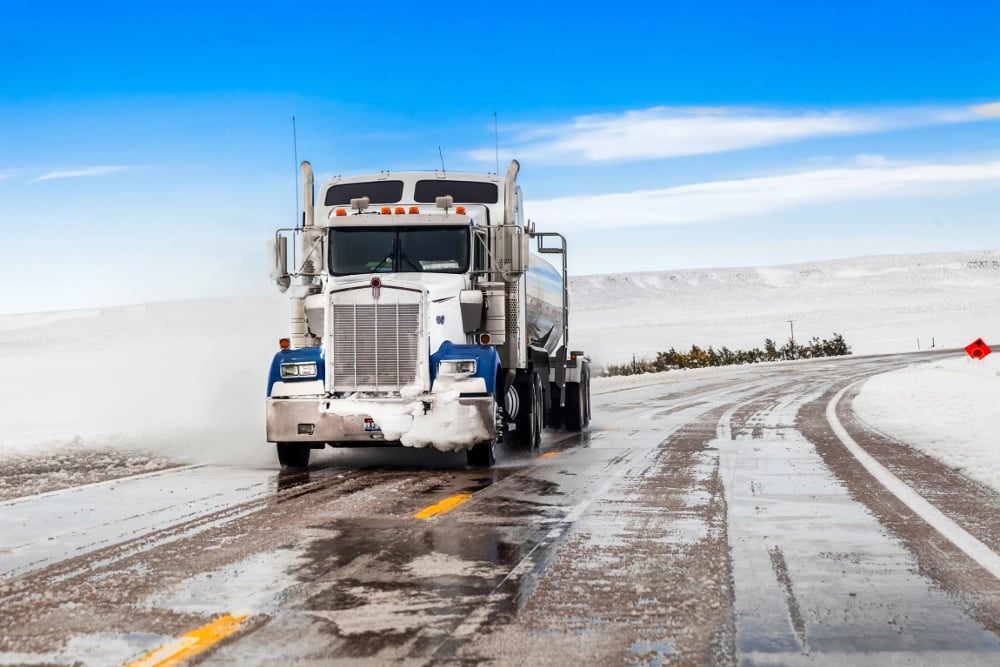
Frost laws, also known as seasonal weight restrictions or spring thaw laws, are regulations implemented by some states or province in the United States and Canada to protect roads from damage during the spring thaw. These laws temporarily reduce the allowable weight limits for vehicles to prevent damage to roadways caused by the freeze-thaw cycle.
During the winter months, the ground beneath roads freezes, which makes the roads more rigid and capable of supporting heavier loads. When temperatures rise in the spring, the ground begins to thaw and soften. As a result, roads become more vulnerable to cracking and the formation of potholes due to the increased stress placed on them by heavy vehicles.
Frost laws are typically in effect during late winter to early spring, depending on the region and local weather conditions. The specific weight restrictions and timeframes vary by state or province and can even differ within a state or province depending on the jurisdiction.
These laws may require commercial vehicles to reduce their axle weight, gross vehicle weight, or both. Additionally, some jurisdictions may also impose lower speed limits for heavy vehicles during the frost law period.
Which states and provinces have frost laws?
The specific states and provinces with frost laws can change over time, and local jurisdictions may have their regulations. Below is a list of states and provinces that enforce frost laws:
United States:
- Michigan
- Minnesota
- Montana
- North Dakota
- South Dakota
- Vermont
- New Hampshire
- Maine
- New York
- Wisconsin
Canada:
- Alberta
- British Columbia
- Manitoba
- New Brunswick
- Newfoundland and Labrador
- Northwest Territories
- Nova Scotia
- Ontario
- Prince Edward Island
- Quebec
- Saskatchewan
- Yukon
Other states may also have regional frost laws, and these can change. It's important to verify the most recent information from the state DOT.
Examples of frost laws in US states
Below are a few examples of what frost laws look like in different states in the US. These examples provide a general idea of how frost laws work in different states. It's important to look up the most recent information from the state DOT for the latest and most accurate information on frost laws, weight restrictions, and applicable timeframes.
-
Michigan: Michigan implements frost laws typically between March and May, depending on the weather. During this period, axle weight and gross vehicle weight limits are reduced by up to 35% on certain roads. Speed limits for trucks may also be reduced to 35 mph.
-
Minnesota: Minnesota's frost laws typically go into effect between March and May. The state reduces weight limits on its roads by 10% during the spring thaw season. Restrictions apply to both gross vehicle weight and axle weight limits, with more significant restrictions on less durable roads.
-
Wisconsin: In Wisconsin, seasonal weight restrictions can be imposed on certain roads during the spring thaw, typically from March through May. The restrictions reduce the allowable axle weight by 30% on specific roadways designated as "Class II Highways." Other roads may also have reduced weight limits, depending on the conditions.
-
Maine: Maine's frost laws are usually in effect between March and May. During this time, the state imposes weight restrictions on certain roads. The restrictions can range from 20,000 to 34,000 pounds gross vehicle weight, depending on the road classification and the axle configuration.
What the penalties for not following frost laws?
Fines and penalties are typically imposed on commercial motor carriers and drivers who exceed the weight limits or violate other restrictions during the thaw season. Some common penalties for not following frost laws are:
-
Fines: Depending on the state, fines can be calculated based on the amount by which the vehicle exceeds the weight limit, or they can be set as a fixed amount. Fines can range from a few hundred dollars to several thousand dollars, depending on the severity of the violation and the jurisdiction.
-
Out-of-service orders: Vehicles found to be in violation of frost laws may be ordered out of service until the weight is reduced to comply with the restrictions. This can result in delays and additional expenses for the motor carrier.
-
Road damage liability: If a vehicle is found to have caused road damage due to non-compliance with frost laws, the carrier may be held liable for the costs of repairing the damage. This can lead to significant expenses for carriers and drivers.
-
Impact on safety records: Violations of frost laws can also impact a carrier's CSA Score, since they may be reported to the FMCSA. This can lead to more frequent DOT audits and other issues.
-
Increased insurance premiums: Violations of frost laws can result in increased insurance premiums for motor carriers, as they may be considered a higher risk due to non-compliance with regulations.
How can you comply with frost laws?
Frost laws are designed to protect state roads from excessive damage caused by heavy trucks. By knowing what the frost laws are in the states or provinces that you are traveling you can better navigate how follow these laws.
Knowing the gross and axle weight of your truck is the first step in following frost laws. You can find out what your gross and axle weights are by scaling at an in-ground scale or by using calibrated pressure gauges on your truck and trailer. This information will help you properly balance your truck to cause least amount of damage while driving.
If you are over the axle weight limits set by some frost laws, you can try adjusting your loads using your 5th wheel or sliding your trailer tandems. This process helps shift some of the weight off of heavy axles and place it on axles that can hold more weight.

